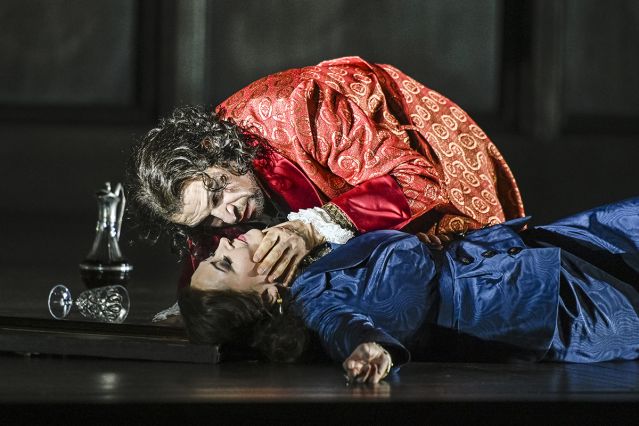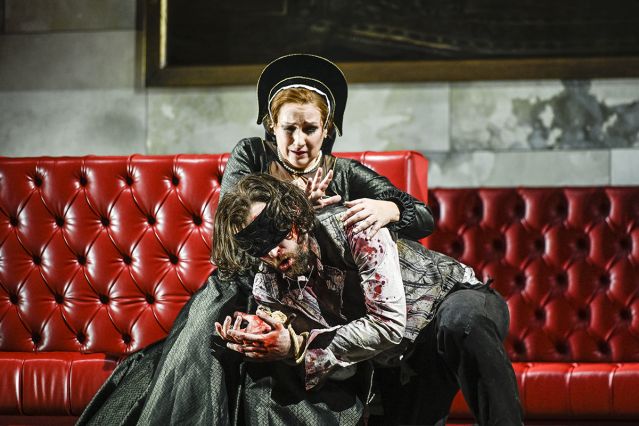Stirb langsam, Anna - Deutsche Oper Berlin
Die hard, Anna
Enrique Mazzola and David Alden stage ANNA BOLENA, Donizetti’s bel canto masterpiece. A conversation about violence, powerlessness and arguably the longest closing aria in the operatic canon.
Mr Alden, Mr Mazzola, You’re staging ANNA BOLENA at the Deutsche Oper Berlin. What is it about this first work in Gaetano Donizetti’s Tudor trilogy that fascinates you?
David Alden: I’ve always hankered after staging the trilogy, especially ANNA BOLENA. I love Donizetti and I’m really into bel canto – not just because of the amazing music but also because the stories are narrated so well. If you ask me, it was a quality that was underrated for ages; people thought of bel canto as something for music lovers and voice and coloratura obsessives. All true enough, but there’s more to it. The voices are central to the genre, yes, and the singers can really let rip. In the closing scene Anna delivers a monodrama lasting almost thirty minutes in which she experiences the full gamut of emotions before meeting her end. It’s a tour de force not only vocally but on a dramatic level, too. It’s great theatre.
Enrique Mazzola: The thing I love about ANNA BOLENA is that we get the bel canto genre at its absolute zenith, in its purest form. The work was written in 1830, when Bellini was the bel canto superstar and Donizetti was keen to assert himself with this opera. Picture a Lady Gaga giving her debut in a pop landscape dominated by an icon like Madonna. Donizetti had a one-off opportunity to air his world premiere at Milan’s Teatro Carcano in the same season that Bellini was presenting his LA SONNAMBULA for the first time. Imagine the pressure. He wanted to pull off something extraordinary – and he succeeded.

You’ve called it the most complex opera in the trilogy. Why?
Mazzola: It’s definitely the »showiest« of the three operas – in the best sense of the word. Donizetti wanted to show what he could do and it’s the opera with the longest recitative and the longest and most complex scenes. ANNA BOLENA was his calling card and proved to be his breakout work. It established him as a key exponent of his genre.
Yet complexity alone does not an international hit make. So why was ANNA BOLENA such a triumph with audiences?
Mazzola: Probably due to its emotional intensity. The amazing finale that David mentioned shows this better than any other element. The closing scene was unprecedented in the reserves of strength it demands from the singer. One characteristic of bel canto is the restraint of the orchestra, which is an accompaniment to the voices, never overwhelming them. It’s never the music declaiming fear, rage or love. The music leaves all the emotional expressivity to the singers. Donizetti’s ANNA BOLENA achieves this in a quite unusual way.
There was the legendary performance in 1957, when Maria Callas sang Anna at the Scala Milan, rescuing the opera from obscurity and getting it back on programmes. Does the role require a diva to sing it?
Alden: Yes and no. It requires a very powerful and expressive voice. And we’ve got the person to do that.
Mazzola: I don’t think either that we should be too self-effacing. People are always saying they don’t make divas like Callas anymore. That’s not quite correct. These singers exist, both as supreme vocalists and as extraordinary personalities.
Has a famous performance like that one informed your creative process in any way?
Alden: Funnily enough my first contact with ANNA BOLENA was via the Callas recording, which was pretty much the first time it had been staged since the 19th century. That said, the production was a severely abridged version, which was standard back then; many works were shortened for the audiences of the day. It’s a shame, if you ask me. Yes, the length of the piece is quite a challenge, but that’s this opera for you. Don’t you think, Enrique?
Mazzola: Totally. We want to convey to the audience exactly what this opera means to us, and do so as authentically as possible. The singers responsible for the revival of the opera did us a huge service, but we think their approach to the material needs a revamp for our times. They tended to cut out any bits that didn’t pivot around the star, and the edits come over as quite crude today. Which is why David and I kept cuts to a minimum and stayed as faithful to the original as we could.
Mr Alden, you’re known for setting period material in the present day. Have you taken the same approach here?
Alden: Not in the sense you mean, no. There have been some famous productions that transposed the Donizetti trilogy into a modern setting, and that was perfect for the time. But something told me we don’t need that today. If you ask me, people can draw their own parallels. They can invest in the characters and see them not just historical personages as real people but as people who are struggling with complex issues and driven by political and erotic interests. For me, the material is ultra-contemporary, what with its emotional timelessness and the nail-biting relationships involved.

The British royal family has fascinated people for centuries. What do you attribute this to?
Alden: Let’s just say that whatever script writer they’re using, he or she is an amazing author, especially with the same tales of love and power and betrayal being churned out repeatedly. You could call Anne Boleyn the Meghan Markle of our time. When we were getting going on this opera, Markle was constantly in the news and I kept on seeing parallels. The more powerful she got and the more hold she seemed to have over her husband and public opinion, the more people tried to hound her out. Obviously Meghan won’t be beheaded as Anne was, but the public’s disavowal of her and their desire to get rid of her are not dissimilar.
Anna is accused of adultery by her husband, King Henry VIII, and put to death, because he wants to take a new wife. To what extent will modern audiences be able to identify with such archaic relations between the sexes?
Alden: Donizetti empathises strongly with the women in this opera, with Anna Bolena but also with her lady in waiting, Giovanna, who’s basically forced by the king to betray her mistress, even though she loves and admires her. The three queens of Donizetti’s trilogy are prepared to fight to maintain their status in a male-dominated society. There’s a lot of scope there for audiences to relate to.
Anna ditched her previous lover, Henry Percy, to marry the King. Now her past is about to catch up with her. Is it fair to say that this opera is about having to choose between love and power?
Alden: I’d say it’s more about the interweaving of those two things. We’re not dealing here with love on one side and power on the other. Both are intertwined. Love is dangerous and complex and that’s precisely what the opera is about. And that’s precisely what makes it so timeless.
Interview: Annabelle Hirsch. Hirsch is a freelance journalist working for FAS/FAZ, Taz and ZeitOnline among other publications. She publishes non-fiction and translates literary texts from French





